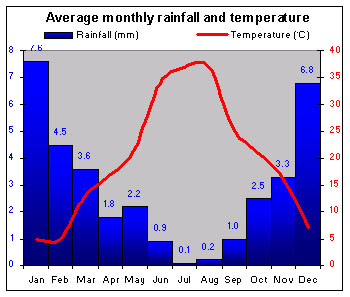COUNTRY INFORMATION |
Introduction |
The island of Cyprus, which rises from a central plateau to a high point at Mount Olympus, lies south of Turkey in the eastern Mediterranean. It was partitioned in 1974, following an invasion by Turkish troops. The south of the island is the Greek Cypriot Republic of Cyprus (Cyprus); the self-proclaimed Turkish Republic of Northern Cyprus (TRNC) is recognized only by Turkey. |
|
Climate |
 |
The climate is typically Mediterranean: summers are hot and dry and winters mild, though there is mountain snow. |
|
People |
|
|
| URBAN/RURAL POPULATION DIVIDE |
|
|
|
Cyprus's Greek majority are Orthodox Christian. The Turkish minority are Muslim. Most Turkish Cypriots are the descendants of Turks who settled on the island from the 16th century, under the rule of the Ottoman Empire. Both Cypriot communities have suffered great upheavals: in 1974 the island was partitioned and 200,000 Greek Cypriots were forced to flee to the south, while 65,000 Turkish Cypriots fled in the other direction. Northern Cyprus is officially recognized only by Turkey. Thousands of mainland Turks have settled on the northern part of the island. Wage levels are on average three times higher in the south, where eastern European contract labor is brought in to staff the hotel industry. Unemployment levels in the north, meanwhile, are rising. |
|
Economy |
| GNP (US$) |
9361
|
M |
GNP World rank |
86
|
|
| Inflation |
4 |
% |
Unemployment |
4 |
% |
|
StrengthsBooming tourism industry, accounting for over 20% of GDP. Manufacturing sector and provision of services to Middle Eastern countries. WeaknessesPressure for tighter supervision of offshore finance and crackdown on tax evasion. Limited liberalization. TRNC starved of foreign investment. |
|
Politics |
| Lower house |
Last election |
2001 |
Next election |
2006 |
| Upper house |
Last election |
1998 |
Next election |
2003 |
|
The UN-backed proposal of a two-zone federation for Cyprus would give each community its own territory while sharing a number of government functions and ministries. TRNC president Rauf Denktash, mindful of the Greek Cypriots' repression of the Turks prior to 1974, is unwilling to accept a plan that does not ensure full sovereignty and political equality for Turks. Greek Cypriots, in turn, fear the plan would give too much influence over their affairs to the small Turkish minority, who would be able to veto all government decisions. Fresh impetus was given to talks in 2002 by the imminence of EU membership for Cyprus. |
|
Resources |
| Minerals |
Asbestos, gypsum, iron, bentonite, copper |
|
| Oil reserves (barrels) |
No data |
Oil production (barrels/day) |
Not an oil producer |
|
Cyprus continues to supply electricity to TRNC, but has not been paid for this. The possibility of offshore oil and gas to the south has attracted interest. Water is precious but new desalinization plants have reduced shortages. |
|
Health |
| Life expectancy |
78 |
Life expect. World rank |
17 |
| Population per doctor |
392 |
Infant mortality (per 1000 births) |
6 |
|
|
|
| Principal causes of death |
Heart diseases, accidents, cancers |
|
Health care is more advanced in the south; sophisticated surgery is carried out at Lefkosia General Hospital. |
|
Education |
| Literacy |
97 |
% |
Expend. % GNP |
5 |
%
|
|
| PERCENTAGE OF POPULATION IN FULL TIME EDUCATION |
|
| Primary |
100 |
% |
Secondary |
97 |
% |
Tertiary |
23 |
% |
|
Education is free and compulsory up to the age of 15. Many Greek Cypriots go abroad to university. |
|
Wealth |
| Cars |
343 |
per 1,000 population |
| Telephones |
647 |
per 1,000 population |
| Televisions |
325 |
per 1,000 population |
|
The average income per capita in the southern part of Cyprus is higher than in Greece and Portugal, but slightly lower than that in Spain.
|
History |
Cyprus was dominated, in turn, by Egypt, Greece, the Byzantines, the Ottomans, and the UK before independence in 1960. - 1963 Turkish Cypriots abandon parliament.
- 1974 President Makarios deposed by Greek military junta. Turkey invades. Partition.
- 1983 Self-proclamation of TRNC.
- 1998 Talks on EU membership start, following 1990 application to join.
- 2001 President Clerides visits TRNC.
|
|